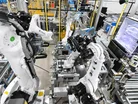LG Electronics Enters Smart Factory Market with AI Tech

LG has officially entered the smart factory solutions market with its Production engineering Research Institute (PRI), which enhances manufacturing competitiveness for LG Group affiliates, and is now expanding its offering to external clients.
It will offer services including production consulting, equipment development and training for technology personnel.
The news comes as Precedence Research finds the global smart factory market is projected to grow from US$155.61bn to US$268.46bn by 2030.
LG has one goal: to develop the smart factory solution. It plans to aggressively expand into industries with rapidly-growing factory demand, such as semiconductors, pharmaceuticals, biotech and food and beverage.
Smart factory solutions increase efficiency
Smart factory solutions minimise human error and process delays, increasing efficiency and profitability for the manufacturer.
LG produces its refrigerators in Changwon, South Korea, where one unit is produced every 13 seconds. This means even a 10-minute delay would result in a shortfall of 50 units, creating a tangible monetary loss.
The impact of these delays only increases for products with faster production speeds, meaning solutions which minimise these delays are essential.
LG offers comprehensive solutions from factory planning to construction and operation, ensuring the client's needs are met through a step-by-step roadmap to automation.
To execute this, LG leverages its vast manufacturing data from 66 years of factory operations. In the past decade alone, the company has amassed 770 TB of manufacturing and production data, equivalent to storing approximately 197,000 high-definition films.
“We will offer optimal smart factory solutions at every stage – from planning and design to construction and operation – becoming the ideal partner that supports our clients throughout their entire production journey,” says Jeong Dae-hwa, Head of LG PRI.
LG aims to set its smart factory solutions apart by integrating this data and expertise with AI. The company’s competitive edge will also lie in its production technology, with PRI filing more than 1,000 patents related to smart factory solutions.
These solutions will range from production system design to digital twin technology, generative AI-based management of quality and safety and the provision of various industrial robots.
Before the factory is built, a virtual replica is created, allowing clients to preview the production and logistics flow. During the operational phase, analysing real-time data helps detect bottlenecks, defects and malfunctions in the production line in advance, thereby contributing to productivity improvement.
Robots will also increase automation
LG will also offer various industrial robotics solutions such as the Autonomous Mobile Robot (AMR), which is equipped with cameras, radar and LiDAR sensors to recognise its surroundings and supply parts and materials.
It navigates effectively, avoiding workers and obstacles through autonomous driving.
Similarly, the Mobile Manipulator (MM) will combine a multi-joint robotic arm with an AMR to automate assembly, defect inspection and transporting parts and materials. It can also replace the batteries of nearby AMRs.
LG is also leveraging AI
In addition to its automation offerings, LG has developed a system which learns the factory's normal operating conditions and detects anomalies such as temperature fluctuations, powered by Vision AI.
It will also increase factory safety management by identifying workers who are not properly wearing safety helmets or work vests.
These developments come as LG’s intelligent autonomous factories in Changwon and the US are recognised as Lighthouse Factories by the World Economic Forum.
After implementing smart manufacturing solutions, productivity at the Changwon plant increased by 17%, while energy efficiency improved by 30% and quality costs due to defects were reduced by 70%.
Within the LG Group, production facilities at more than 60 locations in 40 regions worldwide are applying solutions from PRI.
LG is therefore driving transformation, significantly contributing to the rapid growth of the company’s B2B sector, one of the three key growth drivers in LG’s 2030 Future Vision.
******
Make sure you check out the latest edition of Manufacturing Digital and also sign up to our global conference series - Procurement & Supply Chain 2024 & Sustainability LIVE 2024
******
Manufacturing Digital is a BizClik brand.


